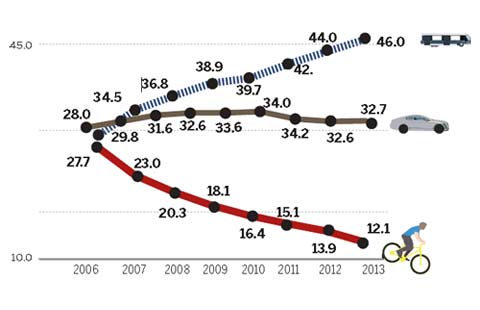'Humanized gene' helps mice learn faster, study finds
Updated: 2014-09-17 08:50
(Xinhua)
|
|||||||||||
Mice that receive a "humanized" version of a speech and language gene show accelerated learning, a new study said on Monday.
Foxp2 is one of several genes that scientists believe may have been linked to human speech and language. Humans carrying only one functional copy of this gene have difficulty with learning and performing complex orofacial movements and have receptive and expressive deficits in oral and written language.
Chimps also have a version of Foxp2, but it differs from the human version by two amino acids because a gene mutation has occurred since the human and chimpanzee lineages separated about 6 million years ago.
In the new study, researchers engineered mice to express the human form of the Foxp2 gene and found that the mice were better at learning to run a T-shaped maze, in which the mice must decide whether to turn left or right at a T-shaped junction, based on the texture of the maze floor, to earn a food reward.
The first phase of this type of learning requires using declarative memory, or memory for events and places. Over time, these memory cues become embedded as habits and are encoded through procedural memory - the type of memory necessary for routine tasks, such as driving to work every day or hitting a tennis forehand after thousands of practice strokes.
Using another type of maze called a cross-maze, the researchers were able to test the mice's ability in each type of memory alone, as well as the interaction of the two memory types.
They found that the mice with humanized Foxp2 performed the same as normal mice when just one type of memory was needed, but their performance was superior when the learning task required them to convert declarative memories into habitual routines.
"The key finding was therefore that the humanized Foxp2 gene makes it easier to turn mindful actions into behavioral routines," researchers from the Massachusetts Institute of Technology and several European universities said in a statement.
The protein produced by Foxp2 is a transcription factor, meaning that it turns other genes on and off.
In this study, the researchers found that Foxp2 appears to turn on genes involved in the regulation of synaptic connections between neurons.
They also found enhanced dopamine activity in a part of the striatum that is involved in forming procedures. "Together, these changes help to 'tune' the brain differently to adapt it to speech and language acquisition."
The findings were published in the US journal Proceedings of the National Academy of the Sciences.
Foxp2 was first identified in a group of family members who had severe difficulties speaking and understanding speech.
Related Stories
Mice found on aircraft in Fujian 2013-10-14 19:07
Researchers hope mice mirror men 2013-06-23 07:52
Rural students attend science summer camp 2014-09-02 09:48
Science show to find talent 2014-07-16 16:12
Public invited to see top science 2014-07-23 15:13
Today's Top News
China's door to open wider, Li says
Shanghai FTZ official removed
Actress stuck in nations' conflict
Space-based technology to help deal with disasters
How will Alibaba justify price?
Master Kong pork noodles made with tainted oil
Beijing to tighten foreign hiring requirements
Queen urges Scots to think 'carefully'
Hot Topics
Lunar probe , China growth forecasts, Emission rules get tougher, China seen through 'colored lens', International board,
Editor's Picks

|

|

|

|

|

|





